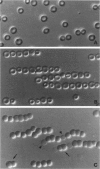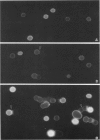Abstract
It has been shown in previous studies that cell poration (i.e., reversible permeabilization of cell membrane) and cell fusion can be induced by applying a pulse (or pulses) of high-intensity DC (direct current) electric field. Recently we suggested that such electro-poration or electro-fusion can also be accomplished by using an oscillating electric field. The DC field relies solely on the dielectric breakdown of the cell membrane to induce cell fusion. The oscillating field, on the other hand, can produce not only a dielectric breakdown, but also a sonicating motion in the membrane that could result in a structural fatigue. Thus, a combination of a DC field and an oscillating field is expected to enhance the efficiency of cell poration and cell fusion. This study is an experimental test of such an idea. Here, pulses of high-intensity, DC-shifted RF (radio frequency) electric field were used to induce cell poration and cell fusion. The fusion experiments were done on human red blood cells. The poration experiments were done on a fibroblast cell line using a molecular probe (which is a DNA plasmid containing the marker gene chloramphenicol acetyltransferase, CAT) and assayed by a gene transfection technique. It was found that the pulsed RF field is highly efficient in both cell fusion and cell poration. Also, in comparison with electro-poration using a DC field, the RF field results in a higher percentage of cells surviving the exposure to the electric field.
Full text
PDF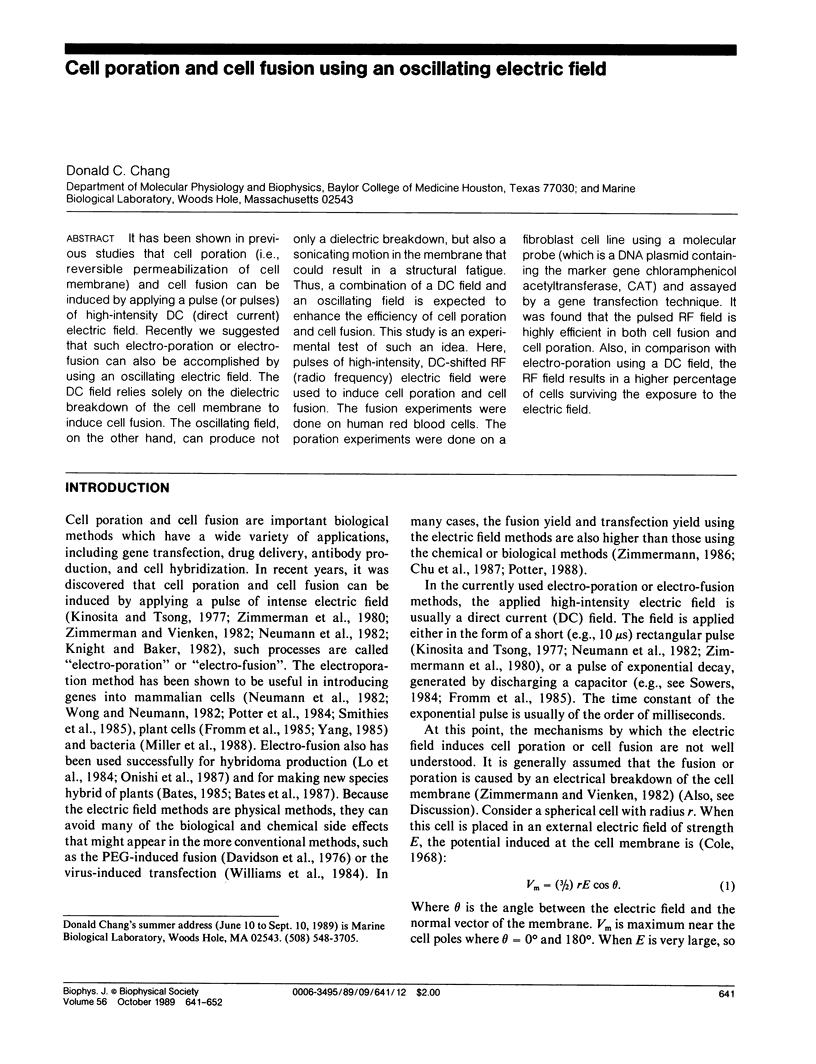
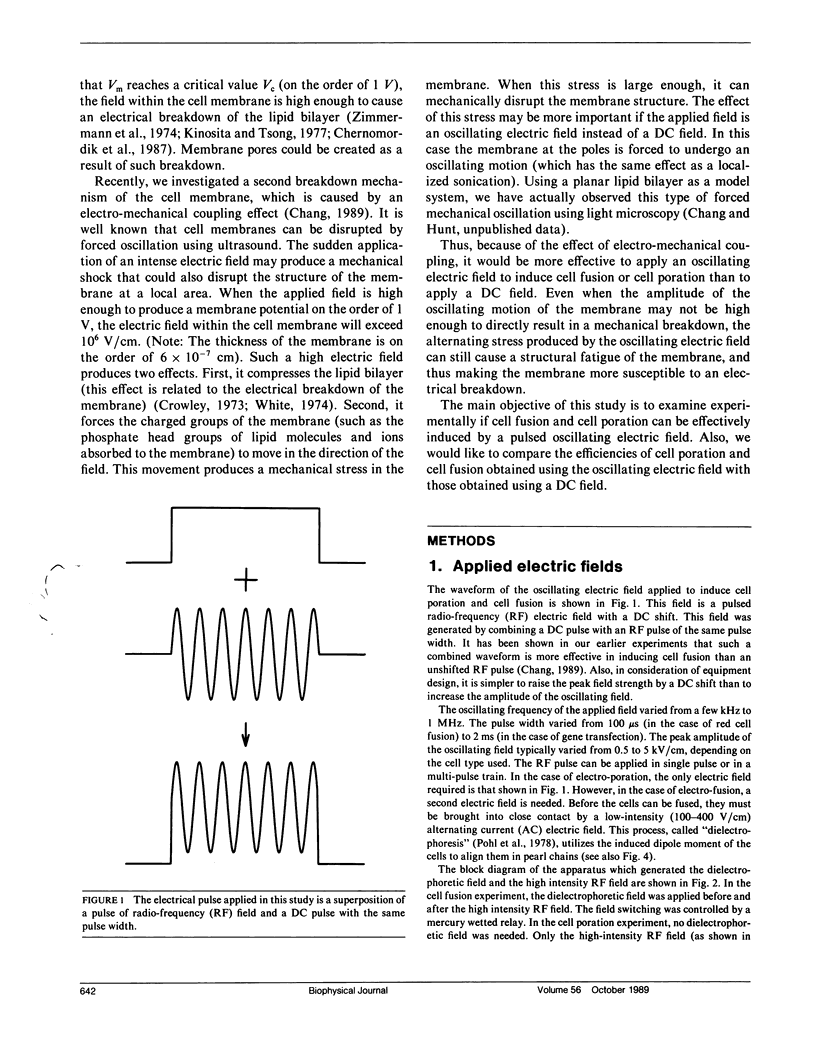
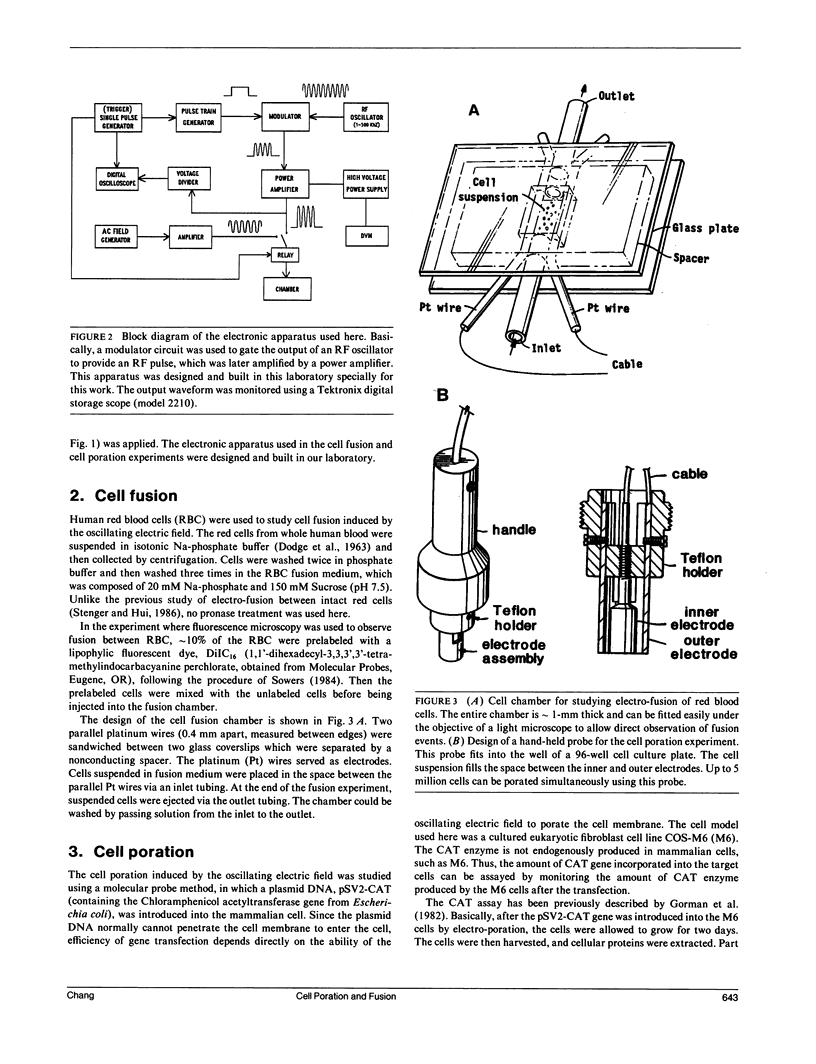
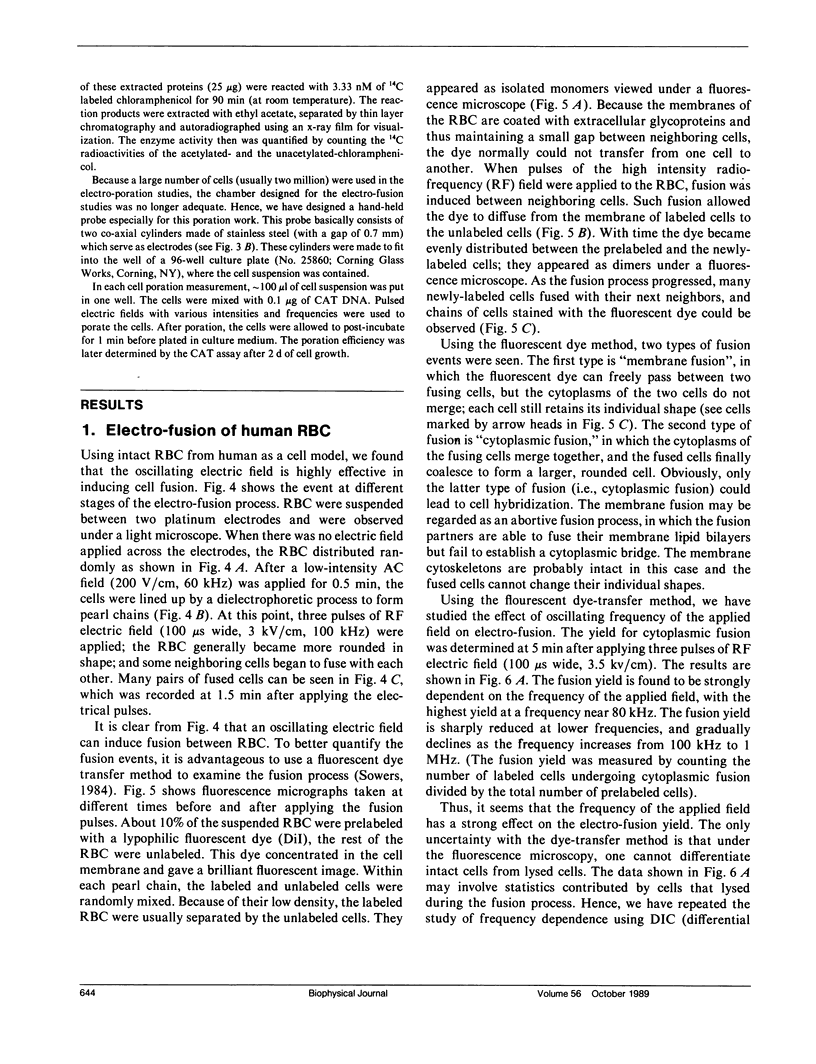
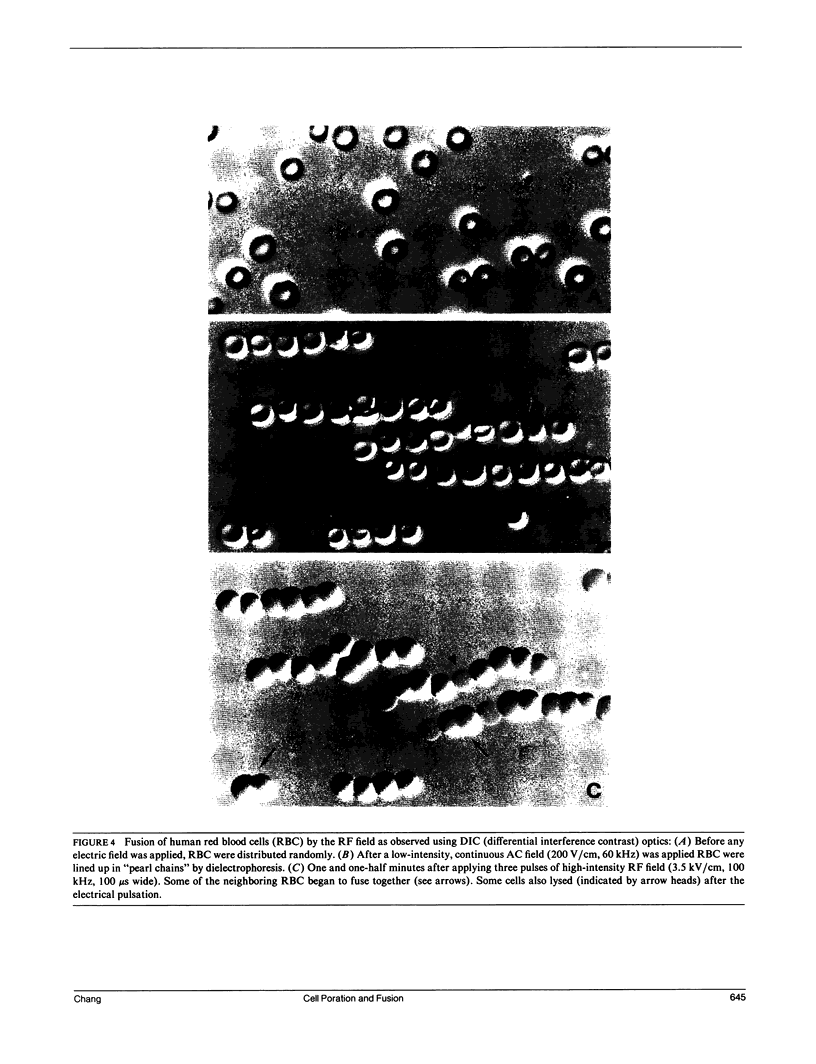
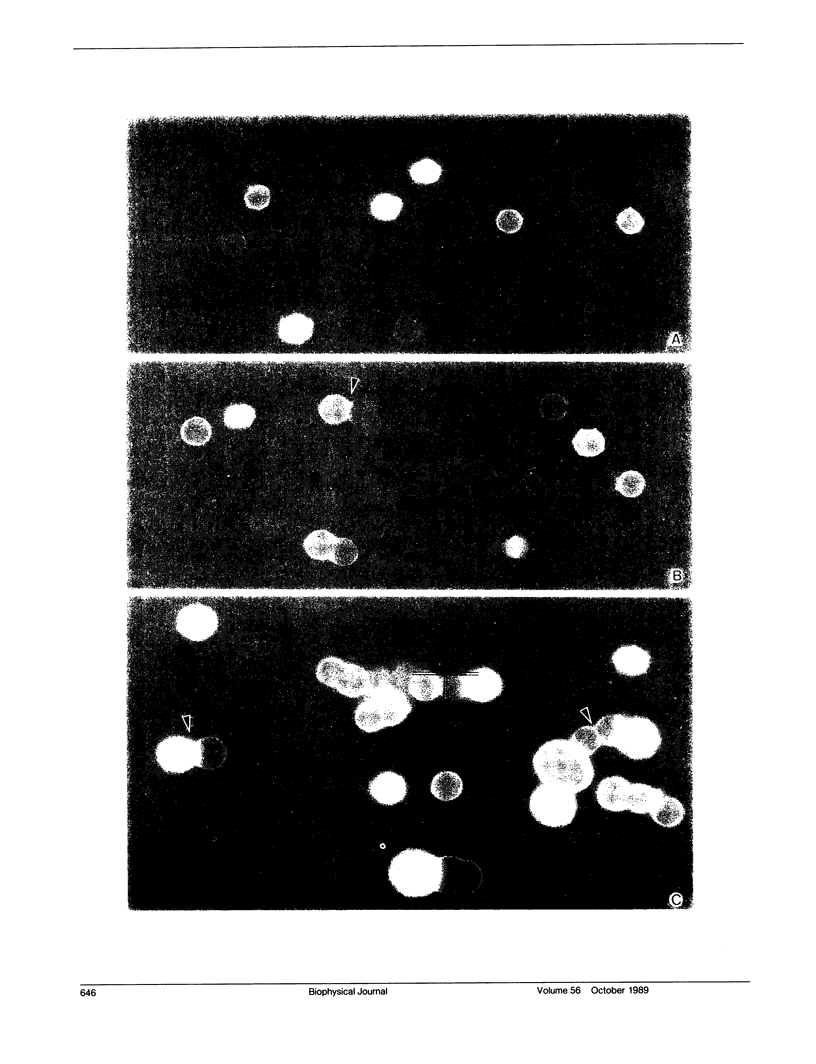
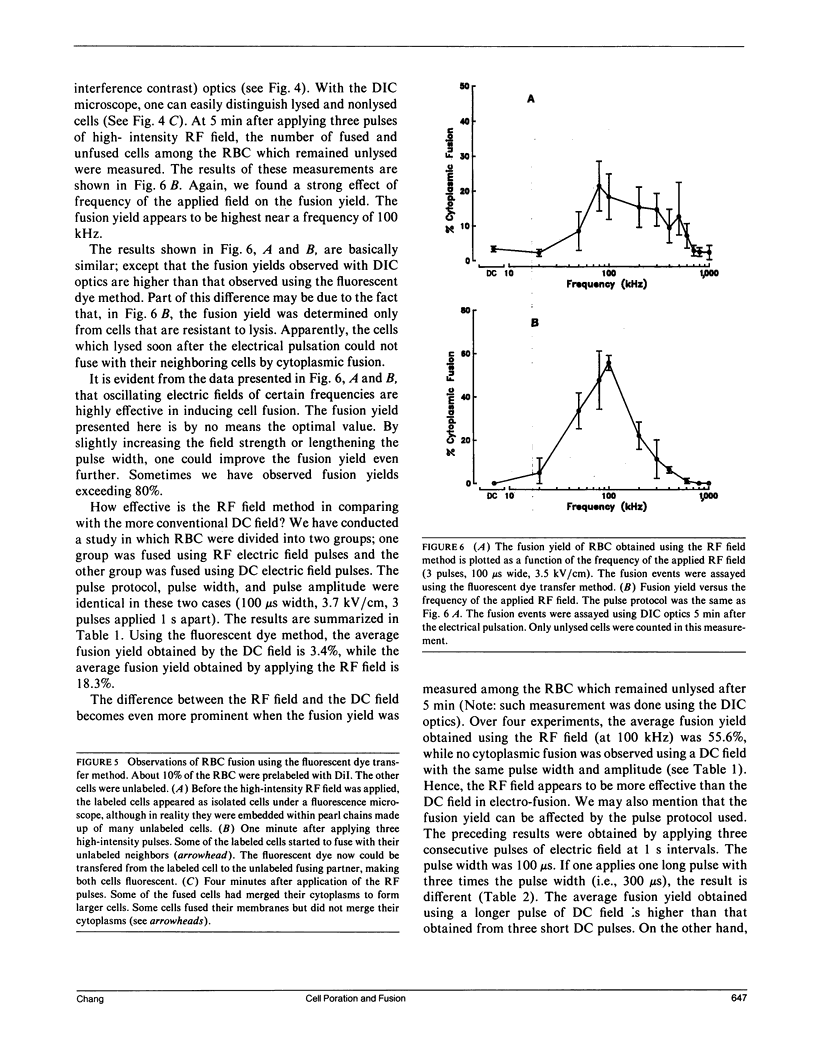
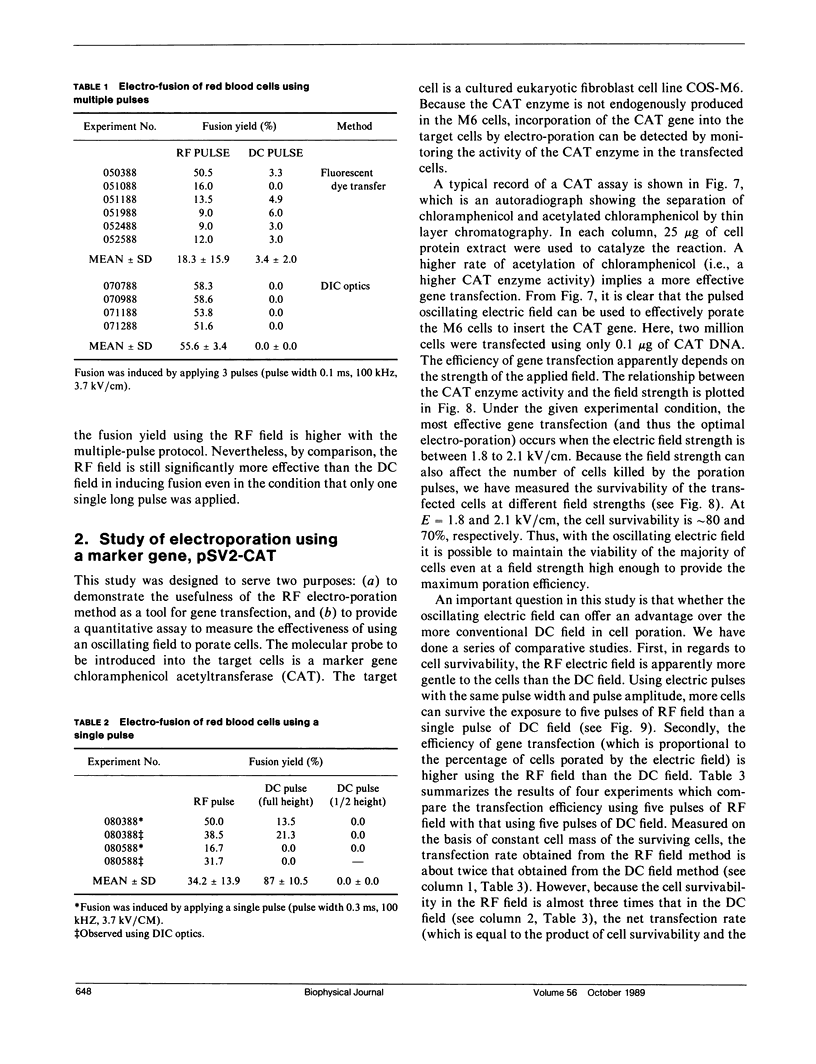
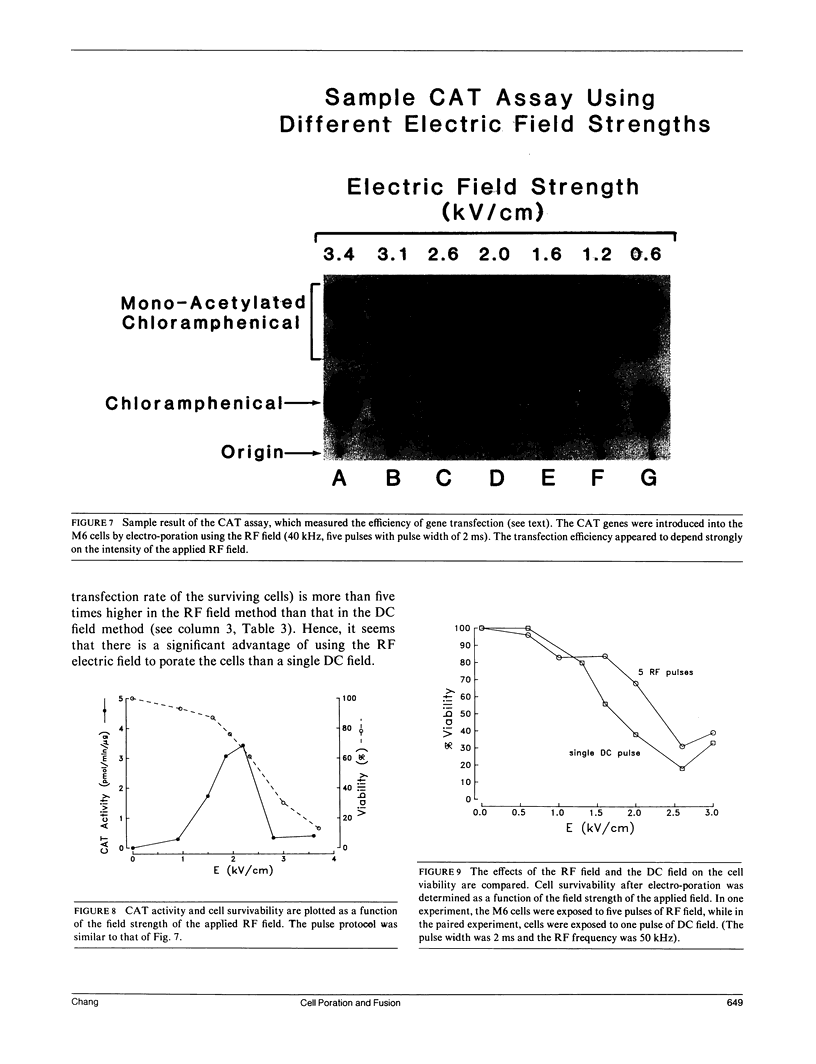
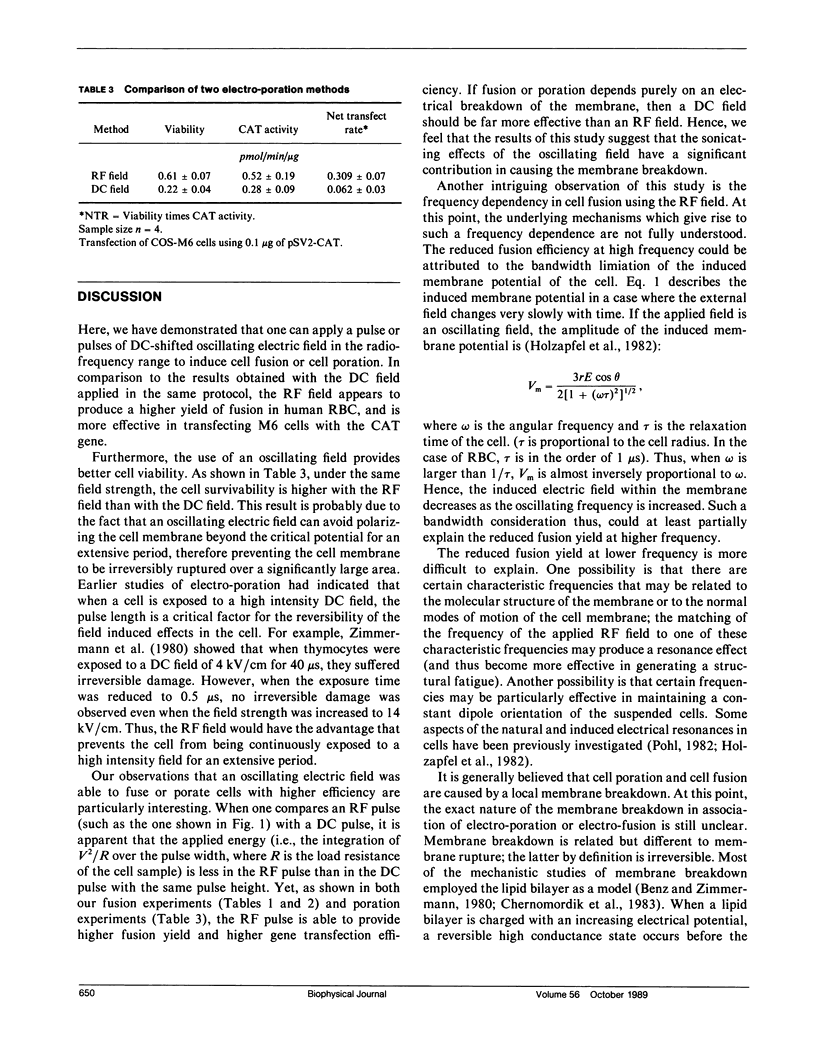
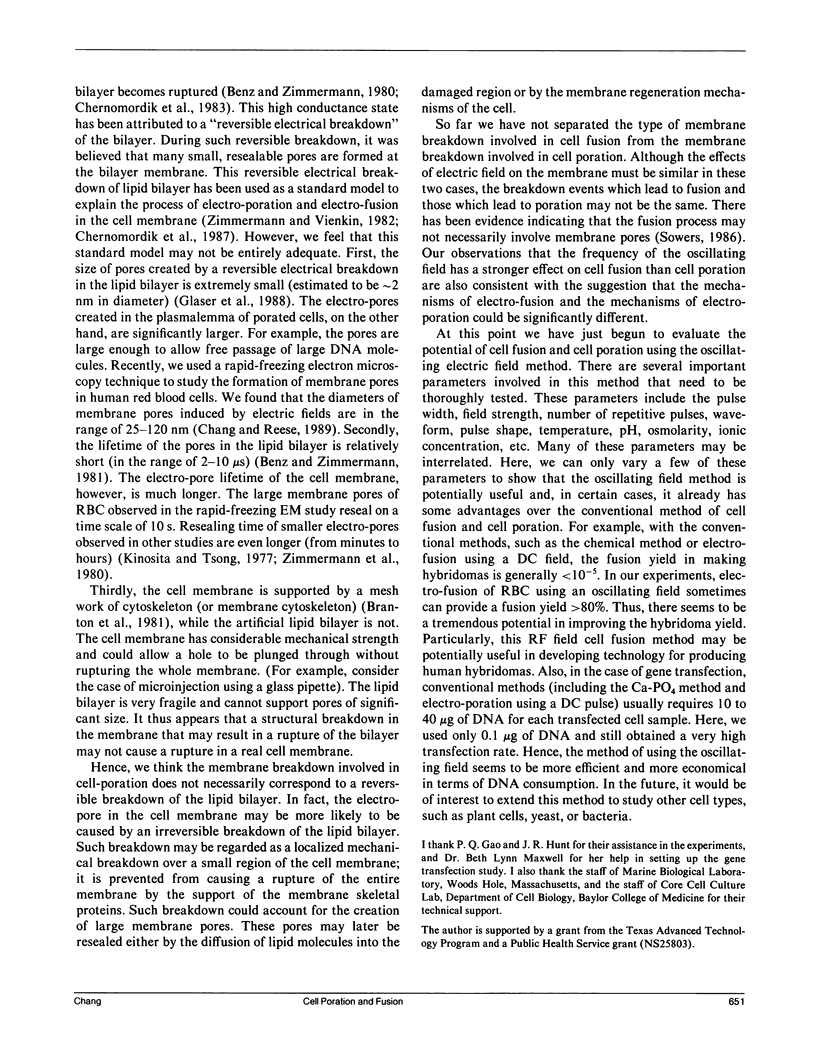
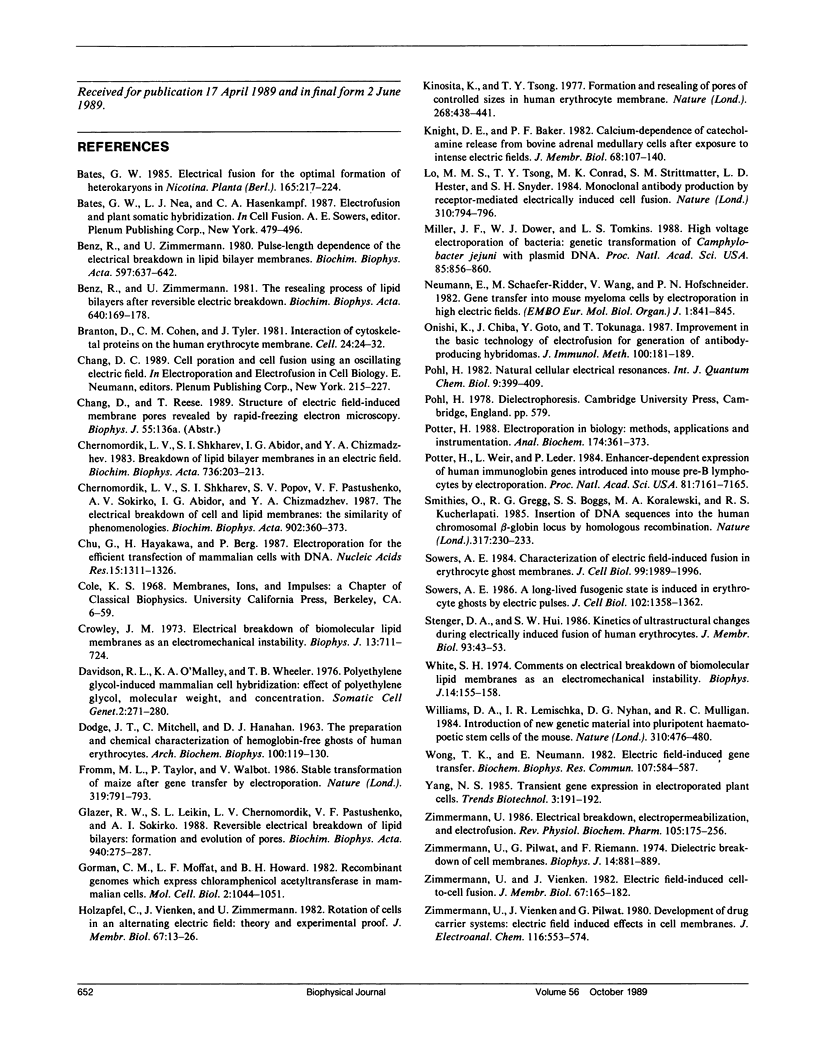
Images in this article
Selected References
These references are in PubMed. This may not be the complete list of references from this article.
- Benz R., Zimmermann U. Pulse-length dependence of the electrical breakdown in lipid bilayer membranes. Biochim Biophys Acta. 1980 Apr 24;597(3):637–642. doi: 10.1016/0005-2736(80)90236-9. [DOI] [PubMed] [Google Scholar]
- Benz R., Zimmermann U. The resealing process of lipid bilayers after reversible electrical breakdown. Biochim Biophys Acta. 1981 Jan 8;640(1):169–178. doi: 10.1016/0005-2736(81)90542-3. [DOI] [PubMed] [Google Scholar]
- Branton D., Cohen C. M., Tyler J. Interaction of cytoskeletal proteins on the human erythrocyte membrane. Cell. 1981 Apr;24(1):24–32. doi: 10.1016/0092-8674(81)90497-9. [DOI] [PubMed] [Google Scholar]
- Chernomordik L. V., Sukharev S. I., Popov S. V., Pastushenko V. F., Sokirko A. V., Abidor I. G., Chizmadzhev Y. A. The electrical breakdown of cell and lipid membranes: the similarity of phenomenologies. Biochim Biophys Acta. 1987 Sep 3;902(3):360–373. doi: 10.1016/0005-2736(87)90204-5. [DOI] [PubMed] [Google Scholar]
- Chu G., Hayakawa H., Berg P. Electroporation for the efficient transfection of mammalian cells with DNA. Nucleic Acids Res. 1987 Feb 11;15(3):1311–1326. doi: 10.1093/nar/15.3.1311. [DOI] [PMC free article] [PubMed] [Google Scholar]
- Crowley J. M. Electrical breakdown of bimolecular lipid membranes as an electromechanical instability. Biophys J. 1973 Jul;13(7):711–724. doi: 10.1016/S0006-3495(73)86017-5. [DOI] [PMC free article] [PubMed] [Google Scholar]
- DODGE J. T., MITCHELL C., HANAHAN D. J. The preparation and chemical characteristics of hemoglobin-free ghosts of human erythrocytes. Arch Biochem Biophys. 1963 Jan;100:119–130. doi: 10.1016/0003-9861(63)90042-0. [DOI] [PubMed] [Google Scholar]
- Davidson R. L., O'Malley K. A., Wheeler T. B. Polyethylene glycol-induced mammalian cell hybridization: effect of polyethylene glycol molecular weight and concentration. Somatic Cell Genet. 1976 May;2(3):271–280. doi: 10.1007/BF01538965. [DOI] [PubMed] [Google Scholar]
- Fromm M. E., Taylor L. P., Walbot V. Stable transformation of maize after gene transfer by electroporation. 1986 Feb 27-Mar 5Nature. 319(6056):791–793. doi: 10.1038/319791a0. [DOI] [PubMed] [Google Scholar]
- Glaser R. W., Leikin S. L., Chernomordik L. V., Pastushenko V. F., Sokirko A. I. Reversible electrical breakdown of lipid bilayers: formation and evolution of pores. Biochim Biophys Acta. 1988 May 24;940(2):275–287. doi: 10.1016/0005-2736(88)90202-7. [DOI] [PubMed] [Google Scholar]
- Gorman C. M., Moffat L. F., Howard B. H. Recombinant genomes which express chloramphenicol acetyltransferase in mammalian cells. Mol Cell Biol. 1982 Sep;2(9):1044–1051. doi: 10.1128/mcb.2.9.1044. [DOI] [PMC free article] [PubMed] [Google Scholar]
- Holzapfel C., Vienken J., Zimmermann U. Rotation of cells in an alternating electric field: theory and experimental proof. J Membr Biol. 1982;67(1):13–26. doi: 10.1007/BF01868644. [DOI] [PubMed] [Google Scholar]
- Kinosita K., Jr, Tsong T. Y. Formation and resealing of pores of controlled sizes in human erythrocyte membrane. Nature. 1977 Aug 4;268(5619):438–441. doi: 10.1038/268438a0. [DOI] [PubMed] [Google Scholar]
- Knight D. E., Baker P. F. Calcium-dependence of catecholamine release from bovine adrenal medullary cells after exposure to intense electric fields. J Membr Biol. 1982;68(2):107–140. doi: 10.1007/BF01872259. [DOI] [PubMed] [Google Scholar]
- Lo M. M., Tsong T. Y., Conrad M. K., Strittmatter S. M., Hester L. D., Snyder S. H. Monoclonal antibody production by receptor-mediated electrically induced cell fusion. 1984 Aug 30-Sep 5Nature. 310(5980):792–794. doi: 10.1038/310792a0. [DOI] [PubMed] [Google Scholar]
- Miller J. F., Dower W. J., Tompkins L. S. High-voltage electroporation of bacteria: genetic transformation of Campylobacter jejuni with plasmid DNA. Proc Natl Acad Sci U S A. 1988 Feb;85(3):856–860. doi: 10.1073/pnas.85.3.856. [DOI] [PMC free article] [PubMed] [Google Scholar]
- Neumann E., Schaefer-Ridder M., Wang Y., Hofschneider P. H. Gene transfer into mouse lyoma cells by electroporation in high electric fields. EMBO J. 1982;1(7):841–845. doi: 10.1002/j.1460-2075.1982.tb01257.x. [DOI] [PMC free article] [PubMed] [Google Scholar]
- Ohnishi K., Chiba J., Goto Y., Tokunaga T. Improvement in the basic technology of electrofusion for generation of antibody-producing hybridomas. J Immunol Methods. 1987 Jun 26;100(1-2):181–189. doi: 10.1016/0022-1759(87)90188-8. [DOI] [PubMed] [Google Scholar]
- Potter H. Electroporation in biology: methods, applications, and instrumentation. Anal Biochem. 1988 Nov 1;174(2):361–373. doi: 10.1016/0003-2697(88)90035-8. [DOI] [PubMed] [Google Scholar]
- Potter H., Weir L., Leder P. Enhancer-dependent expression of human kappa immunoglobulin genes introduced into mouse pre-B lymphocytes by electroporation. Proc Natl Acad Sci U S A. 1984 Nov;81(22):7161–7165. doi: 10.1073/pnas.81.22.7161. [DOI] [PMC free article] [PubMed] [Google Scholar]
- Sowers A. E. A long-lived fusogenic state is induced in erythrocyte ghosts by electric pulses. J Cell Biol. 1986 Apr;102(4):1358–1362. doi: 10.1083/jcb.102.4.1358. [DOI] [PMC free article] [PubMed] [Google Scholar]
- Sowers A. E. Characterization of electric field-induced fusion in erythrocyte ghost membranes. J Cell Biol. 1984 Dec;99(6):1989–1996. doi: 10.1083/jcb.99.6.1989. [DOI] [PMC free article] [PubMed] [Google Scholar]
- Stenger D. A., Hui S. W. Kinetics of ultrastructural changes during electrically induced fusion of human erythrocytes. J Membr Biol. 1986;93(1):43–53. doi: 10.1007/BF01871017. [DOI] [PubMed] [Google Scholar]
- White S. H. Letter: Comments on "electrical breakdown of bimolecular lipid membranes as an electromechanical instability". Biophys J. 1974 Feb;14(2):155–158. doi: 10.1016/S0006-3495(74)70007-8. [DOI] [PMC free article] [PubMed] [Google Scholar]
- Williams D. A., Lemischka I. R., Nathan D. G., Mulligan R. C. Introduction of new genetic material into pluripotent haematopoietic stem cells of the mouse. Nature. 1984 Aug 9;310(5977):476–480. doi: 10.1038/310476a0. [DOI] [PubMed] [Google Scholar]
- Wong T. K., Neumann E. Electric field mediated gene transfer. Biochem Biophys Res Commun. 1982 Jul 30;107(2):584–587. doi: 10.1016/0006-291x(82)91531-5. [DOI] [PubMed] [Google Scholar]
- Zimmermann U. Electrical breakdown, electropermeabilization and electrofusion. Rev Physiol Biochem Pharmacol. 1986;105:176–256. [PubMed] [Google Scholar]
- Zimmermann U., Pilwat G., Riemann F. Dielectric breakdown of cell membranes. Biophys J. 1974 Nov;14(11):881–899. doi: 10.1016/S0006-3495(74)85956-4. [DOI] [PMC free article] [PubMed] [Google Scholar]
- Zimmermann U., Vienken J. Electric field-induced cell-to-cell fusion. J Membr Biol. 1982;67(3):165–182. doi: 10.1007/BF01868659. [DOI] [PubMed] [Google Scholar]



